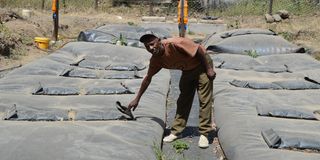Poo power: How a Nakuru based school is turning human waste into clean energy

Mr John Mburu who is in charge of the Biogas project at Rurii Primary in Kabatini, Bahati sub-county, Nakuru County operating a gas cooker that uses biogas at the school on January 8, 2025. The school uses the biogas to cook lunch for pupils, teachers and non-teaching staff. PHOTO| FRANCIS MUREITHI
What you need to know:
- The biogas site has black plastic bags made in the structure of water tanks. They require protection from sharp objects to avoid leakages. Mr Mburu, says that he safeguards the place to prevent such from happening. The area is also fenced using wire mesh to control the number of people accessing it.
A school in Nakuru city that used to have pit latrines has adopted modern toilets that are now generating biogas, thanks to bio digester solutions. The Rurii primary school is located in the Kabatini area, where there is a water aquifer, and the construction of the modern toilets is a mitigation measure to the pollution of the underground water that used to happen through the pit latrines.
“We have connected six-inch pipes in the modern toilets that transports the human wastes from the toilets to the biogas site,” John Mburu, who is in charge of the project told Climate Action.
The biogas site has black plastic bags made in the structure of water tanks. They require protection from sharp objects to avoid leakages. Mr Mburu, says that he safeguards the place to prevent such from happening. The area is also fenced using wire mesh to control the number of people accessing it.
“Human wastes from the modern toilets get to this biogas site in water form. That fluid is held in a black plastic bag until it gets full before distributing its content to the other two plastic bags through pipes,” Mr Mburu explains to Climate Action.
He adds that by the time the process is over, what is generated as biogas fuel gets to the kitchen through a 2-inch pipe without any waste. That makes it an ideal source of fire to cook various meals at the school.
“We have a designed vibrating bucket that has a soil-like content which absorbs the bad biogas smell. The clean gas then flows to the kitchen cooker and is lit using a matchstick to produce fire,” says Mr Mburu.
About 80 per cent of water used in Nakuru city by the residents come from Kabatini aquifer. The fact that Rurii primary school is located on top of this key water source, water resource management experts say that having pit latrines on top of any aquifer means that there is bound to be potential contamination of the underground water.
“We worked with Nakuru Water and Sanitation Services Company Ltd and we were able to get a donor so that we are able to control the pollution of the water underground. Instead of using the pit latrine, now we use those modern toilets,” Mr Kinyanjui tells Climate Action.
He adds that by switching from pit latrines to the modern toilets, the school now collects all the wastes and uses it to generate biogas, which is then used in their kitchen for cooking instead of cutting down trees for fuel.
“There are different kinds of trees that we plant. Recently we have planted fruit trees like avocados, and oranges and if at all they do well, we will be giving pupils those fruits to improve their nutrition,” says Mr Kinyanjui.





